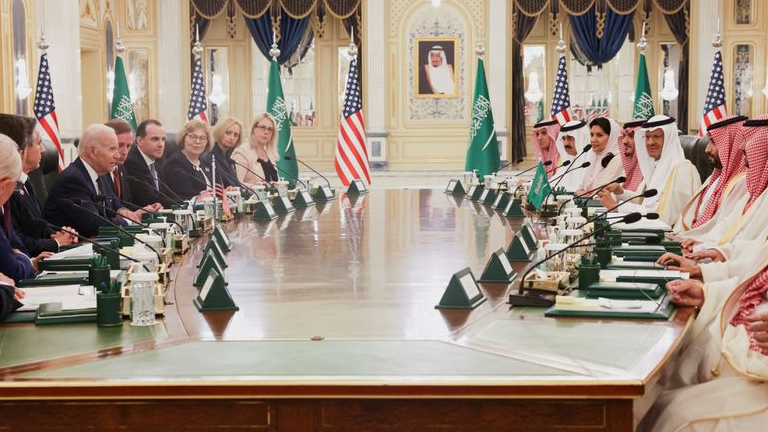
Turning business into geopolitical weapons is a terrible blow to free trade. /CGTN
Turning business into geopolitical weapons is a terrible blow to free trade. /CGTN
Editor's note: CGTN's First Voice provides instant commentary on breaking stories. The daily column clarifies emerging issues and better defines the news agenda, offering a Chinese perspective on the latest global events.
It is a routine political trick for the U.S. government: Leaking information to the press (usually under the names of the people with titles such as "administration officials") to signal the administration's positions to either persuade, pressure or intimidate the intended recipients of that information to comply with America's will.
The trick was deployed recently when NBC reported on October 18 that the Biden administration officials are considering to discourage U.S. companies from expanding business ties with Saudi Arabia. It is reported that the White House is "furious" with Saudi Arabia after OPEC+ announced a larger than expected cut on oil production despite lobbying from the U.S.'s concerns that OPEC+'s decision will increase gas prices and "provide an economic lifeline to Russia." U.S. officials have accused Saudi Arabia of arm-twisting others while Saudi Arabia has denied America's assessment and emphasized the decision was a collective one.
Who did what, as well as to what effect, is not the subjective under debate here. The fact that the U.S. government is sending signals of restraining American companies overseas in order to achieve a political objective is the problem.
Saudi Arabia is neither the only nor the first target of U.S.'s business-for-politics strategy. Over the two successive U.S. administrations, China had been bearing the brunt. Take the riots in Hong Kong for example. When China decided to enact the national security law in Hong Kong, the Trump administration signed an executive order ending the preferential economic treat for the city. Under Joe Biden's reign, the U.S. placed restrictions and sanctions on exporting advanced semiconductors, causing the share prices of U.S. semiconductor equipment companies to dive. According to the Asia Times' report on October 17, American semiconductor equipment companies KLA, Applied Materials and Lam Research saw their share prices dropped 45 percent, 57 percent and 59 percent respectively.

U.S. President Joe Biden participates in a bilateral meeting with Saudi Arabia's Crown Prince Mohammed bin Salman, at the Al Salam Royal Palace, in Jeddah, Saudi Arabia, July 15, 2022. /Reuters
U.S. President Joe Biden participates in a bilateral meeting with Saudi Arabia's Crown Prince Mohammed bin Salman, at the Al Salam Royal Palace, in Jeddah, Saudi Arabia, July 15, 2022. /Reuters
Either by using a stick for punishment or a carrot for enticement, American businesses have become an integral part of American politicians' geopolitical thinking. The spokesperson for the White House National Security Council said the administration is not reaching out to companies to request them to dial back a presence in Saudi Arabia and that "American companies will make their own decisions about their presence and where to invest." But anyone with a political eye would see the spin in that statement. The United States is more than capable of creating enough pressure at home – either through rousing public sentiment, legislative means or executive actions – to shape an environment under which the companies targeted have no choice but to comply with the government's will.
Using business to raise the political stakes in order to achieve America's strategic goals runs counter to what free trade is. The free trade regime that has helped the world achieved unprecedented prosperity has been gradually disassembled by the American governments, from the protectionist Donald Trump to a Joe Biden who followed up in many of Trump's trade policies and trends. As the United States grows more rogue in deploying multinational corporations as weapons, the free trade regime faces growing threats to its integrity from one of its once most ardent supporters.
What the U.S. doing to China, Saudi Arabia or other targeted states won't just stay as bilateral problems. The U.S.'s actions are having growing possibilities to turn from individual case-based actions to a pattern and eventually becoming its new political philosophy. Free trade can't take a hit like that. The world can't either.
(If you want to contribute and have specific expertise, please contact us at opinions@cgtn.com. Follow @thouse_opinions on Twitter to discover the latest commentaries in the CGTN Opinion Section.)